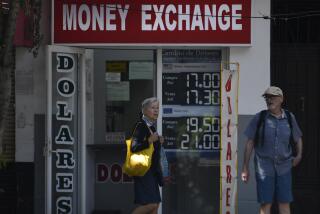OPEC Nations Helping Prevent Dollar’s Plunge : Economy: Experts say the countries have invested in the currency. If war breaks out, oil producers would probably fund a U.S.-led effort against Iraq.
- Share via
NEW YORK — The dollar’s outlook is still bleak and about the only thing keeping it from a free fall is a shift to dollar investments by cash-rich OPEC nations, according to traders and economists.
“We can assume that the Gulf OPEC countries will tend to hold dollar deposits until they determine what to do with their new-found wealth,” said Lars Pedersen, vice president at First Boston Corp.
Economists said the oil-producing countries are sitting on a pile of money, the result of the explosive rise in crude oil prices following Iraq’s invasion of Kuwait on Aug. 2.
Oil shot up from $20 a barrel the day before the invasion, peaking at $41.15 a barrel on Oct. 10. On Tuesday, oil for December delivery on the New York Mercantile Exchange hovered at $30 a barrel.
Traders and economists believe that a sluggish U.S. economy along with widening interest-rate differentials between the United States and its key trading partners, West Germany and Japan, will push the dollar lower in the months ahead.
But increased investment in dollar-based instruments by OPEC nations, such as Saudi Arabia, could at least slow the fall.
Economists said it is too early to gauge just how much more money OPEC countries may shift to U.S. investments such as Treasury bonds. Yet they suspect that more money is going into dollar investments, at least on a short-term basis.
If war breaks out in the Persian Gulf, economists said, OPEC may want to put more money into the United States.
Instead of putting oil money into more attractive instruments in Japan or Germany, the oil producers probably would choose to fund any U.S.-led war effort against Iraq, they said.
“It would eliminate any doubt about where the money would go,” David Hale, chief economist at Kemper Financial Services, said of a military confrontation in the Persian Gulf.
The potential OPEC investment pool is huge.
Hale said an average oil price of $35 a barrel could triple Saudi Arabia’s yearly oil revenue to $60 billion.
First Boston’s Pedersen said in a report that the world’s oil exporters would reap a windfall of about $40 billion a quarter if oil prices were to average $35 a barrel, with about half of the revenue going to Persian Gulf countries.
Treasury securities would be the most likely beneficiary among the U.S. investments, the experts said.
Salomon Bros. economists believe that OPEC countries accounted for the “lion’s share” of the roughly $14 billion of foreign purchases of Treasury bonds during the last quarter.
More to Read
Inside the business of entertainment
The Wide Shot brings you news, analysis and insights on everything from streaming wars to production — and what it all means for the future.
You may occasionally receive promotional content from the Los Angeles Times.










